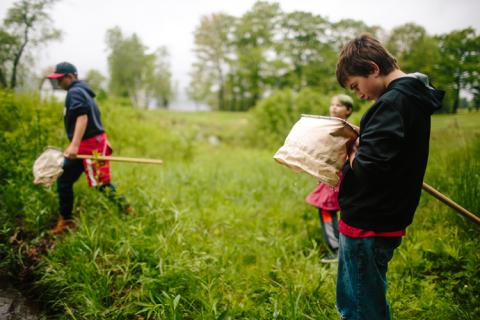UNH Receives Grant to Improve Science Education in New Hampshire

Making connections is the foundation of good science, and a new National Science Foundation grant-funded program will connect UNH Cooperative Extension volunteers with New Hampshire educators to improve Granite State science education.
UNH Cooperative Extension, in partnership with the Joan and James Leitzel Center and the UNH Education Department, has received a National Science Foundation Discovery Research PreK-12 (NSF DRK-12) grant to improve science education in New Hampshire’s schools by bringing together elementary school teachers and Cooperative Extension science volunteers for a community-based professional development partnership. The team is the first at UNH to receive a highly-competitive NSF DRK-12 grant.
Known as Schoolyard Science Investigations by Teachers, Extension Volunteers and Students (Schoolyard SITES), the project connects elementary school teachers with Extension science volunteers in a partnership that improves educators’ confidence, science content knowledge and instructional practice. Together with an UNH interdisciplinary team of experts, teachers and volunteers will learn how to design and implement locally-relevant, community-based citizen science projects with elementary school students.
There is an increasing demand for K-12 professional development that focuses on integrating appropriate content and science practices into elementary classrooms. Schoolyard SITES will work with teachers in New Hampshire to address identified professional development needs that align with Next Generation Science Standards (NGSS) requirements.
“Schoolyard SITES is an innovative partnership between volunteers and teachers that creates a synergistic relationship between the two groups to help teachers carry out field projects with their students,” says Lara Gengarelly, the project’s principal investigator and an Extension associate professor and specialist in science education and outreach.
“Schoolyard SITES will also capitalize on the emerging trends in citizen science programs and their associated learning outcomes,” Gengarelly says. “This works in conjunction with UNH Cooperative Extension’s ongoing efforts to build connections between its volunteer programs and STEM programs in local schools.”
The project team includes Gengarelly; Malin Clyde, a UNH Cooperative Extension specialist in community volunteer development and program manager of Nature Groupie (formerly The Stewardship Network: New England); Erik Froburg, project director at the UNH Leitzel Center for STEM education; Sameer Honwad, an assistant professor of education at UNH; Haley Andreozzi, UNH Cooperative Extension’s wildlife outreach program coordinator; and Megan Glenn, volunteer coordinator for UNH Cooperative Extension’s STEM Docent program.
"This grant is an opportunity to do some meaningful research around the idea of how schools and community members can build partnerships for teaching students STEM topics,” Honwad says. “I am thrilled to be a part of this cutting edge research-practice project"
The program will create partnerships between teachers in grades 2 through 5 and Extension volunteers with a background in life and/or earth science. “I am excited about the opportunity that this gives teachers and their students to apply scientific research methods to develop a new understanding of their surroundings,” Froburg says.
The Rochester School District is the first district to partner with the Schoolyard SITES team. “We are very excited to partner with UNH Cooperative Extension science volunteers to improve education in our schools. Our teachers will learn how to design and implement NGSS-aligned lessons through locally-relevant, community-based citizen science projects,” says Heidi Zollman, the Rochester School District’s curriculum, instruction and assessment coach.
Cooperative Extension science volunteers will come from programs such as Natural Resource Stewards, Marine Docents, Master Gardeners, Coastal Research Volunteers and others. Professional development workshops are expected to begin in the summer of 2018 and teachers and volunteers will collaborate over the course of a single school year.
“I’m looking forward to the new community connections created by matching UNH Cooperative Extension volunteers who are passionate about the environment with local elementary school teachers,” Clyde adds.
Professional development workshops are expected to begin in the summer of 2018 and teachers and volunteers will collaborate over the course of a single school year. The program will be divided into three cohorts, with volunteers working with teachers from Rockingham and Strafford Counties from 2018-2019; teachers from the Manchester and Nashua school districts from 2019-2020, and teachers from the Carroll and Coös County school districts from 2020-2021.